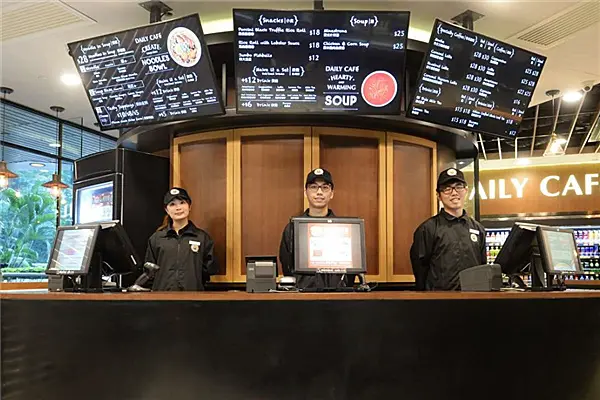(SOUTH CHINA MORNING POST) Going to a 7-Eleven is not usually a memorable experience. The chain has made a name for itself by being as faceless as it is ubiquitous. No matter where in the world you are, if you step inside a 7-Eleven, you can expect the same experience.
Not any more. A new 7-Eleven in the Lippo Centre in Hong Kong’s Admiralty business district boasts wood-panelled walls and an alfresco dining area under lush vegetation. Opened in January, this is 7-Eleven’s first concept store/cafe, and it is a complete departure from the cheap vibe the brand is known for. The 1,400 sq ft cafe has a noodle bar where customers can order a soup with udon, ramen, rice noodles or Korean glass noodles, and a choice of more than 20 toppings including onsen egg, Vietnamese sausage roll, Japanese-style barbecue pork and Korean kimchi. A bowl of noodles with three toppings costs about HK$60.
While more than 170 7-Elevens in the city have sold coffee for the past five years, the Lippo Centre store has two baristas making fresh-brewed coffees ranging from HK$22 to HK$30 a cup. Among the other surprises on offer are truffle rice rolls (HK$25) and milk ice-cream with coffee (HK$35).
The convenience store isn’t the only company to have ventured into dining. Grocery store chain 759 has branched out into wonton noodle restaurants, bakeries and Chinese restaurants. And following the opening of its first cafe, in an upmarket mall in Shanghai in April 2015, fashion chain Vivienne Westwood opened a cafe in Hong Kong - adjacent to its store in the Ocean Terminal mall, in Tsim Sha Tsui – in October 2015. The cafe serves afternoon tea, drinks and pastries with an English flavour, such as strawberry truffle cake and carrot cake.
Emma Chan, marketing and communications manager for Vivienne Westwood Hong Kong, says the move was planned five years ago. “We hope our customers can feel the creativity of Vivienne Westwood in another form,” she says.
The 600 sq ft cafe features tea caddies and kettle sets in Westwood tartan designs and cutlery with the label’s orb logo.
“On the menu, there are offerings that Westwood herself likes to eat, such as carrot cake and coffee and rum cake,” Chan says. A tea set for two with scones, apricot tart, smoked salmon sandwiches, tiramisu and other desserts costs HK$468.
Chan says the cafe was partly designed by Westwood and her husband, Andreas Kronthaler. She says the company might open more. “Shoppers like to enjoy a drink or two after making fashion purchases,” she says.
Another company trying high-end dining is Mercedes-Benz, which opened a restaurant in Hong Kong in September 2015. The first restaurant under the brand, Mercedes Me, was opened in 2014 in Hamburg, Germany, and Mercedes now has restaurants in cities including Milan, Tokyo, Moscow and Beijing.
The Hong Kong branch, in Central, is operated by dining group Maximal Concepts, and offers Spanish, Japanese and Peruvian fusion cuisine. The 3,800 sq ft space has a bar and restaurant, a showroom with vintage car models and TVs showing live broadcasts of Formula One races. On the walls are framed black-and-white pictures of Mercedes cars. A Formula One racing car sits at the entrance. Overseen by Spanish chef Edgar Sanuy, the menu includes Spanish octopus with smoked paprika for HK$200, and lamb short ribs with romesco sauce and padron green peppers at HK$390.
HMV opened its flagship Hong Kong store in the Causeway Bay shopping district in November 2015. The three-storey, 40,000 sq ft store sells personal electronic accessories, lifestyle products, books, magazines, music and films. On the top floor is a 12,000 sq ft Western restaurant with a stage for live musical performances.
For the past two years there has been a cafe inside HMV’s shop in Central. Robert Esser, chief executive of HMV Media and Entertainment, says the success of the Central operation prompted HMV to expand its food and beverage business.
“The Central store has a small cafe with a bar. It’s full at lunchtime and in the afternoon. We did quite well with the concept,” he says, adding that HMV has enjoyed a growth in revenue for the first time in six years.
It’s a turnaround in fortunes for the music retailer, whose sales have been hit by the onslaught of music streaming technologies such as Spotify. The British retail chain entered administration in January 2013. AID Partners Capital, a Hong Kong-based buyout firm focusing on the entertainment and media industry, later bought HMV’s businesses in Hong Kong and Singapore as well as operating licences for China.
Esser says it is HMV’s strategy to evolve into a lifestyle destination.
The restaurant area in the Causeway Bay flagship store can sit 240 people and employs 28 staff. The menu offers burgers, pasta, salads and Hong-Kong-style rice and noodles. The HMV burger with tomato, cheddar cheese and Australian wagyu is HK$158.
“All the booths [in the restaurant] have power outlets [for laptops or phones]. We want people to hang out and relax here,” Esser says. The live stage is booked almost every day. “We aim to expand the live music offering and promote local artists by getting local musicians and indie groups on stage.
“It’s a hangout space where you can listen to music, enjoy nice food and have a look at the latest lifestyle products. We want it to be an urban lifestyle emporium.”
 简体中文
简体中文

